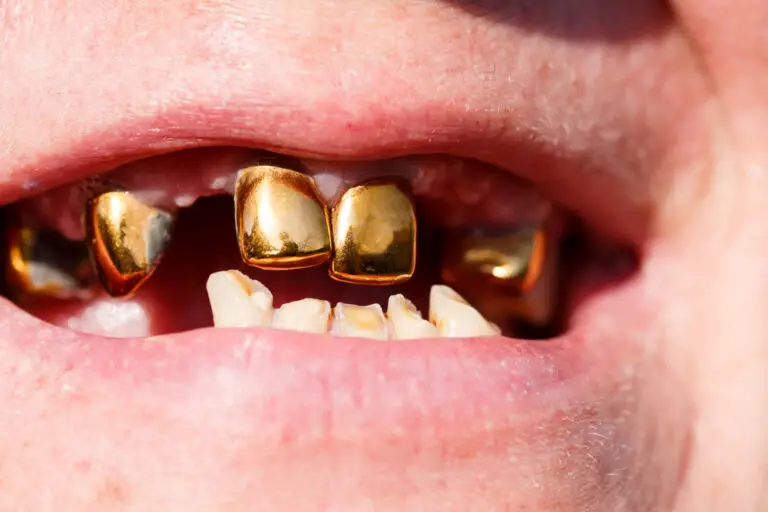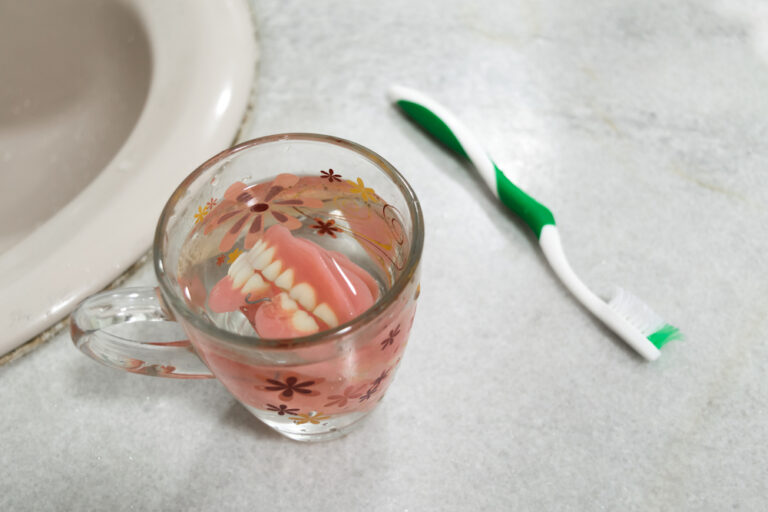Do you have a black tooth? Are you wondering if it’s a cause for concern? Black teeth can be alarming, but they don’t always indicate a serious problem. In some cases, they can simply be a cosmetic issue. However, in other cases, they may be a sign of underlying dental issues that require medical attention.
There are several reasons why teeth may turn black. One of the most common causes is decay or cavities, which can start as black spots and progress to larger areas of discoloration. Other causes of black teeth include trauma, smoking, poor oral hygiene, and certain medications. In some cases, black teeth may be due to internal factors such as genetics or developmental issues.
If you’re concerned about black teeth, it’s important to seek the advice of a dental professional. They can determine the cause of the discoloration and recommend appropriate treatment options. In some cases, treatment may involve simple procedures such as teeth whitening or fillings. However, in more severe cases, more extensive dental work may be required.
Understanding Black Teeth
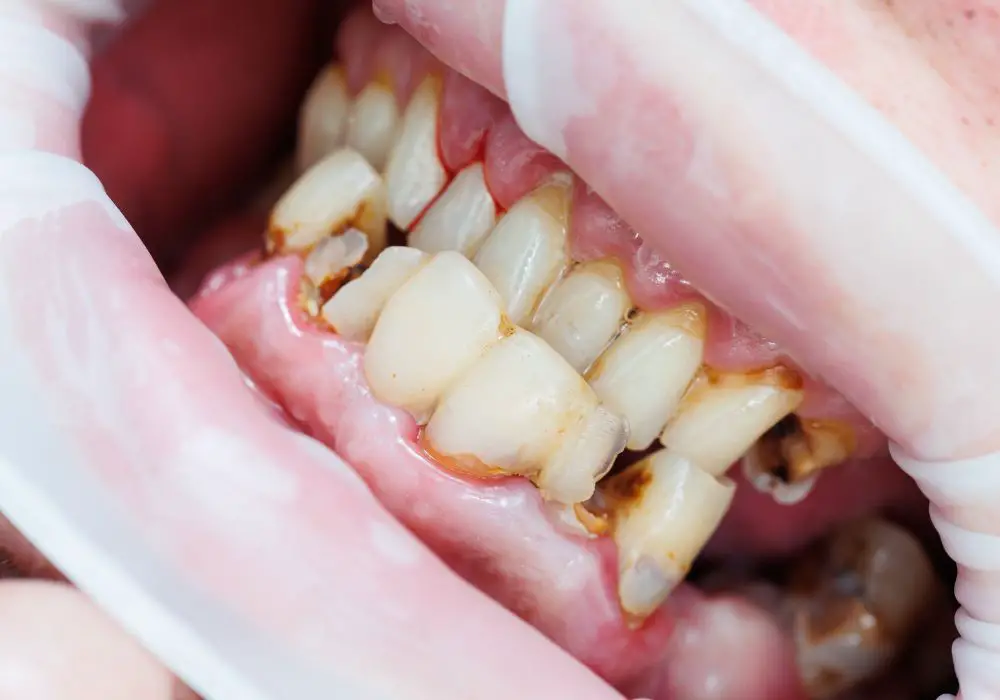
Black teeth can be a cause for concern, as they can indicate underlying dental problems that require treatment. Teeth typically range in color from white to whitish-yellow and whitish-gray. However, teeth can take on a darker tone due to various factors, such as poor oral hygiene, dental decay, or staining from certain foods and drinks.
When it comes to understanding black teeth, it’s essential to know that there are two types of discoloration: extrinsic and intrinsic. Extrinsic stains are caused by external factors, such as smoking, drinking coffee, tea, or red wine, or consuming foods that are high in pigments like berries or tomato sauce. These stains typically affect the enamel, the outer layer of the tooth, and can often be removed with professional cleaning or teeth whitening treatments.
Intrinsic stains, on the other hand, are caused by internal factors and affect the dentin, the inner layer of the tooth. These stains can be more challenging to remove and may require more extensive treatment, such as bonding, veneers, or crowns. Intrinsic staining can be caused by a variety of factors, including:
- Dental decay or cavities
- Trauma to the tooth
- Certain medications, such as tetracycline
- Excessive fluoride intake
- Aging
It’s important to note that black teeth can also be a sign of more serious dental problems, such as periodontal disease or tooth decay. If you notice black spots or discoloration on your teeth, it’s crucial to schedule an appointment with your dentist as soon as possible to determine the underlying cause and receive appropriate treatment.
In summary, black teeth can be a symptom of underlying dental problems that shouldn’t be ignored. Understanding the different types of discoloration and their causes can help you take proactive steps to maintain good oral health and prevent further damage. If you’re concerned about the color of your teeth, don’t hesitate to consult with your dentist.
Causes of Black Teeth
There are several factors that can lead to black teeth. Here are some of the most common causes:
Poor Oral Hygiene
Not brushing your teeth regularly can lead to the buildup of plaque and tartar, which can cause tooth decay and discoloration. When left untreated, tooth decay can lead to black spots or patches on your teeth.
Certain Foods and Drinks
Consuming dark-colored foods and drinks such as coffee, tea, red wine, and cola can stain your teeth over time. Acidic foods and drinks can also erode your tooth enamel, making your teeth more susceptible to discoloration.
Smoking and Tobacco Use
Smoking and using tobacco products can cause yellow or brown stains on your teeth. Over time, these stains can turn black and become more difficult to remove.
Certain Medications
Some medications, such as tetracycline and doxycycline, can cause tooth discoloration, especially in children under the age of 8. Other medications, such as antihistamines and high blood pressure medications, can also cause tooth discoloration as a side effect.
Advanced Tooth Decay
When tooth decay goes untreated for a long time, it can lead to black spots or patches on your teeth. In severe cases, the decay can even reach the pulp of your tooth, causing it to turn black.
Trauma to the Tooth
Trauma to your tooth, such as a fall or injury, can cause it to turn black. This can happen when the blood vessels inside the tooth are damaged, causing the tooth to die and turn black.
It’s important to note that black teeth can also be a sign of other underlying dental issues, such as gum disease or oral cancer. If you notice any discoloration or changes in your teeth, it’s best to consult with a dentist to determine the cause and appropriate treatment.
Symptoms Accompanying Black Teeth
If you have black teeth, you may also experience other symptoms that indicate an underlying dental issue. Here are some common symptoms that can accompany black teeth:
Bad Breath
Bad breath, also known as halitosis, is a common symptom that can accompany black teeth. This is because black teeth are often caused by decay or infection, which can produce an unpleasant odor. If you have black teeth and bad breath, it is important to see a dentist as soon as possible to address the underlying issue.
Tooth Pain
Tooth pain is another common symptom that can accompany black teeth. This can range from mild discomfort to severe pain, depending on the underlying cause. If you have black teeth and tooth pain, it is important to see a dentist as soon as possible to determine the cause and receive appropriate treatment.
Gum Swelling
Gum swelling is another symptom that can accompany black teeth. This can be a sign of gum disease, which can lead to tooth loss if left untreated. If you have black teeth and gum swelling, it is important to see a dentist as soon as possible to receive appropriate treatment and prevent further damage.
In summary, black teeth can be a symptom of underlying dental issues that may cause bad breath, tooth pain, and gum swelling. If you are experiencing any of these symptoms, it is important to see a dentist as soon as possible to address the underlying issue and prevent further damage.
Diagnosis of Black Teeth
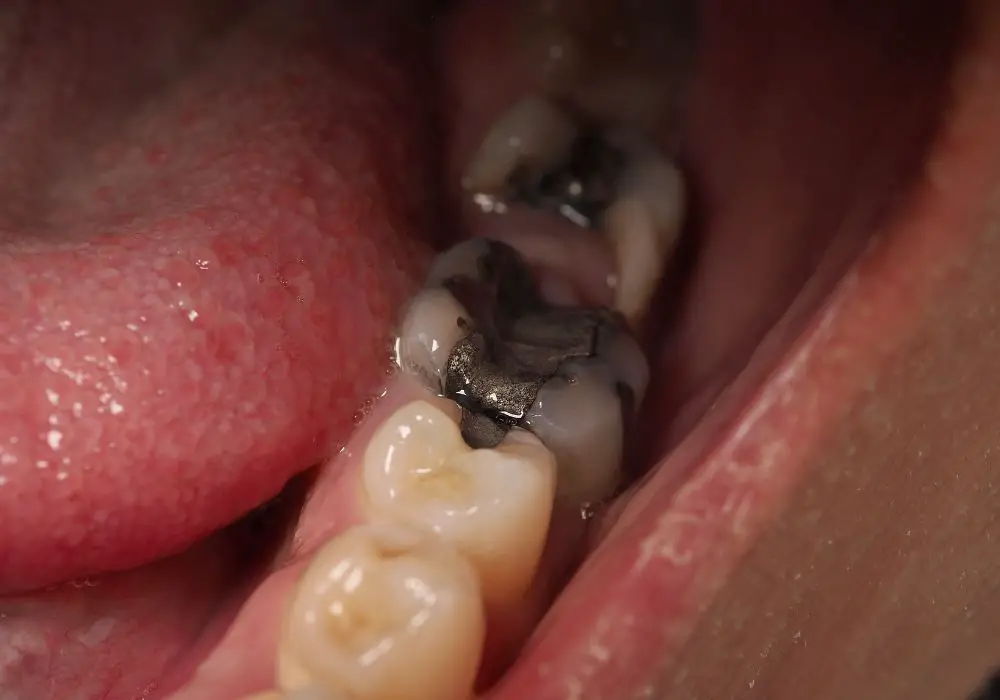
If you notice black spots or discoloration on your teeth, it’s important to get a proper diagnosis from a dentist. Here are some steps your dentist may take to diagnose black teeth:
- Visual examination: Your dentist will examine your teeth and gums to look for signs of decay, discoloration, and other issues that may be causing your black teeth.
- Dental X-rays: Your dentist may take X-rays to look for signs of decay or other issues that may not be visible during a visual examination.
- Medical history: Your dentist may ask about your medical history, including any medications you’re taking, to determine if they could be contributing to your black teeth.
- Lifestyle habits: Your dentist may ask about your lifestyle habits, such as your diet and oral hygiene routine, to determine if they could be contributing to your black teeth.
Once your dentist has diagnosed the underlying cause of your black teeth, they can recommend an appropriate treatment plan. Treatment options may include fillings, root canals, professional teeth cleaning, and teeth whitening. In some cases, tooth extraction may be necessary if the damage is severe.
It’s important to address black teeth as soon as possible to prevent further damage and potential complications. Regular dental checkups and good oral hygiene habits can help prevent black teeth and other dental issues.
Treatment Options for Black Teeth
If you have black teeth, there are several treatment options available. The appropriate treatment will depend on the cause and severity of your black teeth. Here are some of the most common treatment options for black teeth:
Professional Cleaning
The first step in treating black teeth is to undergo a professional cleaning. This involves removing any plaque, tartar, and surface stains from your teeth. A dental hygienist will use special tools to clean your teeth and remove any built-up debris. This will help to brighten your teeth and remove any surface stains that may be causing them to appear black.
Root Canal Therapy
If your black teeth are caused by decay or infection, your dentist may recommend root canal therapy. This involves removing the infected pulp from the inside of your tooth and filling the space with a special material. This will help to eliminate the infection and prevent it from spreading. After the root canal procedure, your dentist may place a crown on the tooth to protect it and restore its appearance.
Tooth Extraction
In some cases, a severely decayed or infected tooth may need to be extracted. This is typically a last resort and is only recommended if other treatment options are not viable. After the tooth is extracted, your dentist may recommend a dental implant or bridge to replace the missing tooth and restore your smile.
Veneers and Crowns
If your black teeth are caused by surface stains or discoloration, your dentist may recommend veneers or crowns. Veneers are thin shells that are bonded to the front of your teeth to improve their appearance. Crowns are caps that are placed over your teeth to restore their shape and function. Both veneers and crowns can be made to match the color of your surrounding teeth, helping to improve the appearance of your smile.
In summary, there are several treatment options available for black teeth, including professional cleaning, root canal therapy, tooth extraction, and veneers or crowns. Your dentist will be able to recommend the best treatment option for your specific needs based on the cause and severity of your black teeth.
Prevention Strategies for Black Teeth
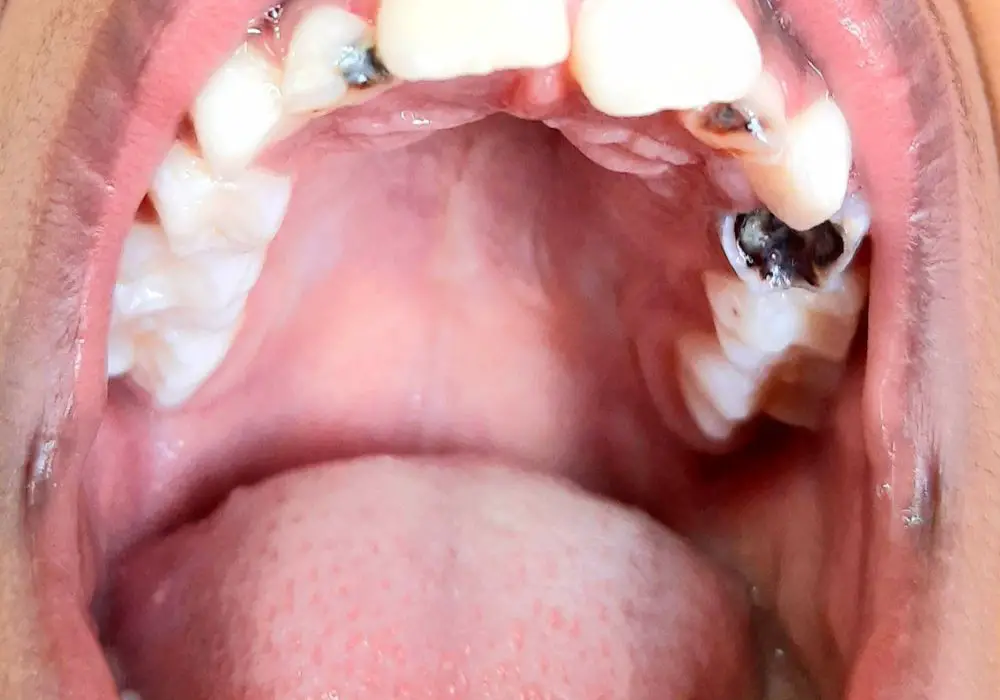
Preventing black teeth involves taking good care of your oral health. Here are some strategies that can help prevent black teeth:
Regular Dental Checkups
It is important to visit your dentist regularly for checkups and cleanings. Your dentist can detect any early signs of tooth decay or gum disease and provide the necessary treatment to prevent black teeth.
Maintaining Good Oral Hygiene
Good oral hygiene is essential for preventing black teeth. Brush your teeth at least twice a day with fluoride toothpaste and floss at least once a day. This will help remove plaque and food particles that can cause tooth decay and gum disease.
Healthy Diet
Eating a healthy diet can also help prevent black teeth. Avoid sugary and acidic foods and drinks, which can erode tooth enamel and cause tooth decay. Instead, eat a balanced diet that includes plenty of fruits, vegetables, and whole grains.
Avoiding Tobacco Products
Tobacco products can stain your teeth and increase your risk of gum disease and oral cancer. If you use tobacco products, consider quitting. Your dentist can provide resources and support to help you quit.
By following these prevention strategies, you can help keep your teeth healthy and prevent black teeth. Remember to visit your dentist regularly for checkups and cleanings, maintain good oral hygiene, eat a healthy diet, and avoid tobacco products.
Frequently Asked Questions
What causes teeth to turn black?
Teeth can turn black due to various reasons. Some of the most common causes include dental decay, poor oral hygiene, smoking, certain medications, and consuming dark-colored food or drinks like coffee, tea, and red wine. Black teeth can also be a sign of dental trauma or a dead tooth.
How can black stains on teeth be removed?
The treatment for black stains on teeth depends on the cause. In some cases, regular brushing and flossing can remove surface stains. However, if the staining is due to decay or trauma, professional dental treatment is necessary. Teeth whitening, dental bonding, and veneers are some of the options that can be considered.
Can a black tooth be saved?
It depends on the cause of the black tooth. If the tooth is black due to decay, it may be possible to save it with a root canal treatment. However, if the tooth is dead or severely damaged, it may need to be extracted.
Is a black tooth a sign of decay?
Yes, a black tooth can be a sign of decay. When bacteria in the mouth produce acid, it can eat away at the tooth enamel, causing decay. If left untreated, the decay can progress and lead to a black or darkened tooth.
What are the treatment options for black teeth?
The treatment for black teeth depends on the cause and severity of the issue. Some treatment options include professional cleaning, teeth whitening, dental bonding, veneers, root canal treatment, and extraction.
When is a black tooth considered a dental emergency?
A black tooth is considered a dental emergency if it is accompanied by severe pain, swelling, or bleeding. It is important to seek immediate dental care if you experience any of these symptoms.




